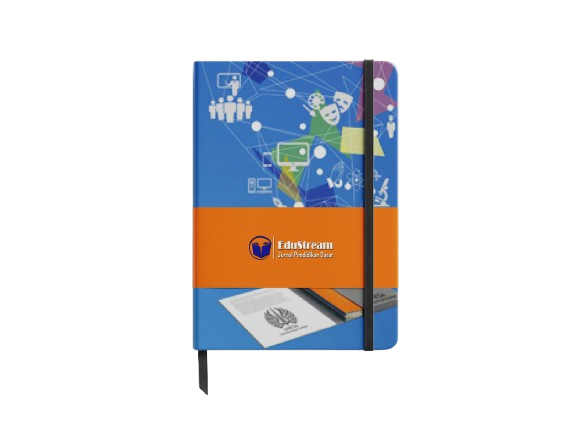About the Journal
Focus and Scope
EduStream: Journal of Elementary Education
EduStream is a scientific journal dedicated to various aspects of elementary education, aimed at providing a platform for academics, researchers, educators, and practitioners to publish the latest research and innovations in the field of elementary education. We invite contributions in the form of research articles, literature reviews, and best practice reports relevant to the development of elementary education both in Indonesia and globally.
EduStream welcomes submissions on a wide range of topics that are integral to elementary education, including:
-
Science: Articles exploring science education at the elementary level, including curriculum development, assessment methods, innovative teaching strategies, and integrating STEM (Science, Technology, Engineering, and Mathematics) approaches to enhance students’ understanding of science.
-
Technology: Research focusing on the use of technology in education, including digital tools such as computers, tablets, and web-based educational applications to improve teaching effectiveness, as well as the role of technology in supporting distance learning.
-
Religion and Character Education: Studies on religious education and the moral development of students, including how character education can be integrated into the elementary curriculum to foster students with strong ethical values and moral integrity.
-
Ethno-Pedagogy: Articles discussing teaching approaches based on local culture, emphasizing traditional and indigenous teaching methods that enrich the learning process and strengthen cultural identity in elementary education.
-
Art: Research in the fields of art education, music education, and drama education aimed at developing students’ creativity through expressive and innovative teaching methods. EduStream welcomes contributions that explore effective strategies for teaching art in elementary schools.
-
Mathematics: Research on mathematics education, covering curriculum development, teaching strategies, assessment techniques, and innovative approaches to improving students’ mathematical literacy at the elementary level.
EduStream is also deeply committed to the principles of inclusion and equity in education. We encourage research that promotes inclusive education, where all children, including those with special needs, have equal access to quality education. This aligns with Sustainable Development Goal (SDG) 4, which seeks to “Ensure inclusive and equitable quality education and promote lifelong learning opportunities for all.” In addition, we welcome research that supports other SDGs, such as SDG 5, which focuses on achieving gender equality in education, SDG 10 on reducing inequalities in access to education, and SDG 13, which emphasizes the role of education in addressing climate change and supporting sustainability.
EduStream is not only a platform for researchers and academics, but is also open to education practitioners, policymakers, curriculum developers, and teacher educators to share ideas, innovations, and findings. With a rigorous peer-review process, we ensure that each published article meets high academic standards and makes a meaningful contribution to improving inclusive and sustainable elementary education.
EduStream: Jurnal Pendidikan Dasar also carries a Comments and Criticism section, which provides a forum for expressing different viewpoints, comments, clarification, and correction of misunderstandings regarding topics in published papers. Forum for expressing different viewpoints and the correction of misunderstandings regarding topics in published papers. Readers of the journal are earnestly invited to contribute their ideas to this forum. Contributions for Comments and Criticism section should be relatively brief, normally two to four manuscript pages, written in Indonesian and English, and will be published as rapidly as possible.
Peer Review Process
To maintain consistency of the issue, the editorial board has established a peer reviewed process policy :
- The reviewer accepts the task given by the Section Editor in accordance with the competence of the reviewed manuscripts' knowledge
- The reviewer will only review the manuscripts/articles that correspond to Edustream's journal topics, with the approval of the Editor
- Articles may be accepted without revision, minor revision, major revision, or rejection. The results of article reviews by by reviewers will be notified to the author via e-mail. Authors are given the opportunity to revise the articles based on reviewers' suggestions (and editor's) no later than 8 weeks after e-mail notification.
How to Become a Reviewer
- Recorded as the first author in this journal with (at least has) a doctorate degree. Educate at least S-2 majoring in elementary school education or other science that has the same competencies
- Experienced as reviewer or bestari in scientific journal/science education magazine (minimum 1 problem with 1 year working period);
- Understanding the context of the subject matter and the topic of review papers;
- Understanding the scientific writing system by following good Indonesian grammar, and being fluent in English
- Committed to working hard in the successful publishing of reviewed manuscripts.
Publication Frequency
EduStream: Jurnal Pendidikan Dasar is published twice a year (one volume two number) with the number of articles of approximiaty
Open Access Policy
This journal provides immediate open access to its content on the principle that making research freely available to the public supports a greater global exchange of knowledge.
Anti Plagiarism
The submitted article must not contain plagiarism. The editorial team will scan the plagiarism content of the article using the help of Turnitin
Sponsors
Universitas Negeri Surabaya

















